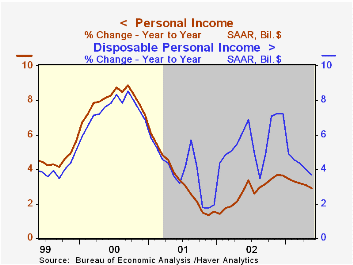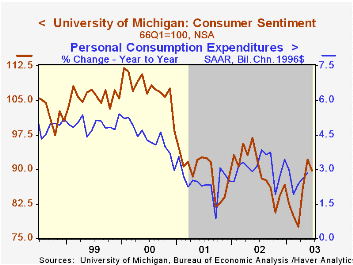 Global| Jun 27 2003
Global| Jun 27 2003Personal Income & Spending Rose, Prices Fell
by:Tom Moeller
|in:Economy in Brief
Summary
Personal income rose an expected 0.3% last month. The gain followed an upwardly revised 0.2% increase in April. The PCE price deflator fell 0.1% in May for the second consecutive monthly decline. Less food and energy, the price [...]

Personal income rose an expected 0.3% last month. The gain followed an upwardly revised 0.2% increase in April.
The PCE price deflator fell 0.1% in May for the second consecutive monthly decline. Less food and energy, the price deflator was unchanged (1.2% y/y) in May and at an annual rate is up 0.7% YTD.
Recent increases in personal income were powered by strong gains in proprietors income, up 1.0% (7.8% y/y) in May and up 1.1% in April. Growth in wages and salaries has been tepid, up 0.1% (2.0% y/y) following no change in April.
Disposable personal income rose 0.3% (3.7% y/y) following 0.2% gains in the prior three months. Personal tax payments are down 0.2% YTD.
Personal consumption expenditures rose by 0.1% for the second consecutive month. The gain was versus Consensus expectations for a 0.2% rise. Spending on durable goods fell 0.7% (5.2% y/y) as light vehicle sales fell moderately. Another drop in gasoline prices pulled nondurable spending down for the second month. Spending on services rose 0.5% (4.6% y/y), the strongest monthly gain since January.
Proceedings of a conference sponsored by the Federal Reserve Bank of New York in May 7, 1999 titled "Unequal Incomes, Unequal Outcomes? Economic Inequality and Measures of Well-Being" can be found here.
| Disposition of Personal Income | May | April | Y/Y | 2002 | 2001 | 2000 |
|---|---|---|---|---|---|---|
| Personal Income | 0.3% | 0.2% | 3.4% | 2.7% | 3.3% | 8.0% |
| Personal Consumption | 0.1% | 0.1% | 4.6% | 4.5% | 4.5% | 7.0% |
| Savings Rate | 3.5% | 3.4% | 4.1% | 3.7% | 2.3% | 2.8% |
| PCE Price Deflator | -0.1% | -0.2% | 1.7% | 1.4% | 2.0% | 2.5% |
by Tom Moeller June 27, 2003

The final June reading of Consumer Sentiment from the University of Michigan was 89.7, down 2.6% versus May. That was firmer than the mid-month reading of 87.2 and firmer than Consensus expectations for a reading of 88.0.
The June drop in Consumer Sentiment contrasted with the reading of Consumer Confidence from the Conference Board that was virtually unchanged m/m. Through June, both measures were up 3.5% YTD.
The index of consumer expectations fell 5.5% m/m versus a mid-month reading that showed a 7.9% decline. The index of current conditions rose 1.6% m/m versus the mid-month read of a 1.3% drop.
Over the last ten years there has been a 64% correlation between the level of consumer sentiment and the y/y change in real PCE. The correlation over the last five years has been 82%.
The University of Michigan survey is not seasonally adjusted.It is based on telephone interviews with 250 households nationwide on personal finances and business and buying conditions. The survey is expanded to a total of 500 interviews at month end.
| University of Michigan | June | May | Y/Y | 2002 | 2001 | 2000 |
|---|---|---|---|---|---|---|
| Consumer Sentiment | 89.7 | 92.1 | -5.6% | 89.6 | 89.2 | 107.6 |
Tom Moeller
AuthorMore in Author Profile »Prior to joining Haver Analytics in 2000, Mr. Moeller worked as the Economist at Chancellor Capital Management from 1985 to 1999. There, he developed comprehensive economic forecasts and interpreted economic data for equity and fixed income portfolio managers. Also at Chancellor, Mr. Moeller worked as an equity analyst and was responsible for researching and rating companies in the economically sensitive automobile and housing industries for investment in Chancellor’s equity portfolio. Prior to joining Chancellor, Mr. Moeller was an Economist at Citibank from 1979 to 1984. He also analyzed pricing behavior in the metals industry for the Council on Wage and Price Stability in Washington, D.C. In 1999, Mr. Moeller received the award for most accurate forecast from the Forecasters' Club of New York. From 1990 to 1992 he was President of the New York Association for Business Economists. Mr. Moeller earned an M.B.A. in Finance from Fordham University, where he graduated in 1987. He holds a Bachelor of Arts in Economics from George Washington University.
More Economy in Brief
 Global| Feb 05 2026
Global| Feb 05 2026Charts of the Week: Balanced Policy, Resilient Data and AI Narratives
by:Andrew Cates






